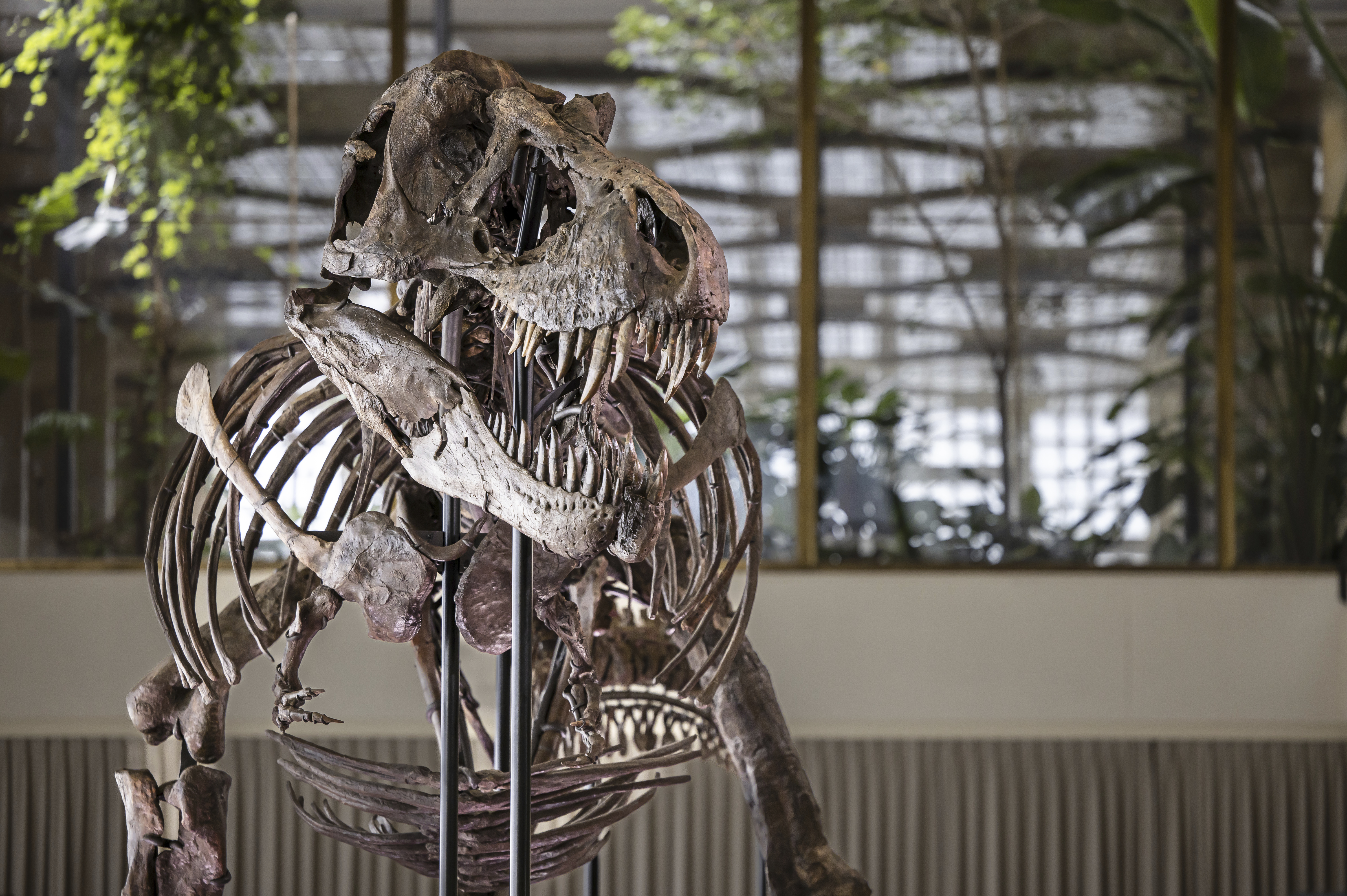'Brilliantly restored' T. rex fossil fetches more than $5M at auction house


A free daily email with the biggest news stories of the day – and the best features from TheWeek.com
You are now subscribed
Your newsletter sign-up was successful
A massive Tyrannosaurus rex skeleton was auctioned off in Switzerland on Tuesday, and investors needed a Jurassic-sized check to get their hands on it.
The composite skeleton, dubbed Trinity, is made up of 293 bones collected from three sites across Montana and Wyoming. It stands 38 feet long and 12.8 feet high, The Associated Press reported, and sold for $5.3 million at the Koller auction house in Zurich.
Trinity is made up of more than half "original bone material," according to Koller, which describes it as "one of the most spectacular T. rex skeletons in existence, a well-preserved and brilliantly restored fossil." Finding a preserved, original T. rex skull — like the one on Trinity — is also a rare feat.
The Week
Escape your echo chamber. Get the facts behind the news, plus analysis from multiple perspectives.

Sign up for The Week's Free Newsletters
From our morning news briefing to a weekly Good News Newsletter, get the best of The Week delivered directly to your inbox.
From our morning news briefing to a weekly Good News Newsletter, get the best of The Week delivered directly to your inbox.
"When dinosaurs died in the Jurassic or Cretaceous periods, they often lost their heads," said scientific advisor Nils Knoetschke, per AP, adding, "Most dinosaurs are found without their skulls, but here we have truly original Tyrannosaurus skull bones that all originate from the same specimen."
Adding to the rarity is the fact that Trinity is "not a cast or a copy, it's the original. And there are very few," Hans Jacob-Siber, a paleontologist at Switzerland's Aathal Dinosaur Museum, told Reuters. "In fact, until about 1970 or 1980, there used to be less than a dozen Tyrannosaurus [skeletons]."
Trinity was just the third completed T. rex skeleton to be offered at auction, and the first ever in Europe. Two other T. rexes found in North America, Sue and Stan, were sold for $8.4 million and $31.8 million, respectively, CNN reported. Sue is a permanent fixture at Chicago's Field Museum of Natural History, and Stan is slated to headline a new natural history museum opening in Abu Dhabi in 2025.
A free daily email with the biggest news stories of the day – and the best features from TheWeek.com
Justin Klawans has worked as a staff writer at The Week since 2022. He began his career covering local news before joining Newsweek as a breaking news reporter, where he wrote about politics, national and global affairs, business, crime, sports, film, television and other news. Justin has also freelanced for outlets including Collider and United Press International.
-
 One great cookbook: Joshua McFadden’s ‘Six Seasons of Pasta’
One great cookbook: Joshua McFadden’s ‘Six Seasons of Pasta’the week recommends The pasta you know and love. But ever so much better.
-
 Scientists are worried about amoebas
Scientists are worried about amoebasUnder the radar Small and very mighty
-
 Buddhist monks’ US walk for peace
Buddhist monks’ US walk for peaceUnder the Radar Crowds have turned out on the roads from California to Washington and ‘millions are finding hope in their journey’
-
 5 recent breakthroughs in biology
5 recent breakthroughs in biologyIn depth From ancient bacteria, to modern cures, to future research
-
 Blue Origin launches Mars probes in NASA debut
Blue Origin launches Mars probes in NASA debutSpeed Read The New Glenn rocket is carrying small twin spacecraft toward Mars as part of NASA’s Escapade mission
-
 Dinosaurs were thriving before asteroid, study finds
Dinosaurs were thriving before asteroid, study findsSpeed Read The dinosaurs would not have gone extinct if not for the asteroid
-
 SpaceX breaks Starship losing streak in 10th test
SpaceX breaks Starship losing streak in 10th testspeed read The Starship rocket's test flight was largely successful, deploying eight dummy satellites during its hour in space
-
 Rabbits with 'horns' sighted across Colorado
Rabbits with 'horns' sighted across Coloradospeed read These creatures are infected with the 'mostly harmless' Shope papilloma virus
-
 Lithium shows promise in Alzheimer's study
Lithium shows promise in Alzheimer's studySpeed Read Potential new treatments could use small amounts of the common metal
-
 Scientists discover cause of massive sea star die-off
Scientists discover cause of massive sea star die-offSpeed Read A bacteria related to cholera has been found responsible for the deaths of more than 5 billion sea stars
-
 'Thriving' ecosystem found 30,000 feet undersea
'Thriving' ecosystem found 30,000 feet underseaSpeed Read Researchers discovered communities of creatures living in frigid, pitch-black waters under high pressure
